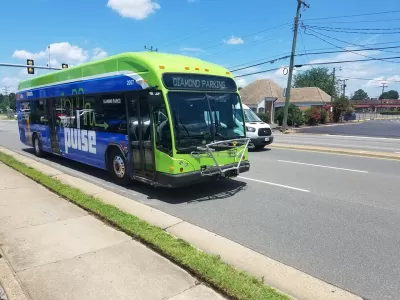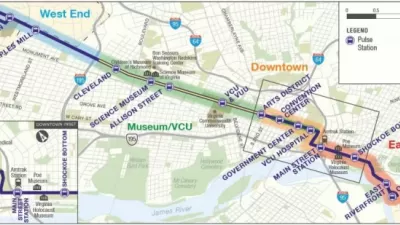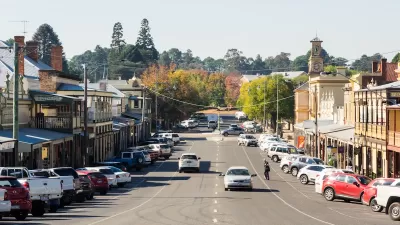The three-year program will expand transit to rural and suburban areas that currently lack access to the region’s fixed-route bus lines.

A three-year microtransit pilot program run by the Greater Richmond Transit Company (GRTC) is coming to six localities in the greater Richmond, Virginia area, reports Wyatt Gordon in Greater Greater Washington.
The program aims to “close mobility gaps in rural and suburban parts of the region via an on-demand system that will allow people to book rides in real time and get picked up and dropped off in designated areas.”
The need is real: “Of the 2,165 square miles which comprise the Greater Richmond region, GRTC’s fixed-route bus service currently only covers 9% of that area, leaving the vast majority of Central Virginia’s more than one million residents with no other options to get around besides owning a private vehicle,” Gordon explains.
The pilot will also give officials insight into transit demand in previously underserved areas. “Such service is an easy way to test demand in areas whose demographics and land use patterns are conducive to transit but don’t yet enjoy any public transportation.”
Details about the type of vehicles to be used in the fleet, fares, and other program elements are yet to be decided. The program is funded in part by a grant from the Department of Rail and Public Transportation’s Transit Riders Incentive Program.
Transit agencies around the country are exploring microtransit and on-demand transit as cost-effective options for expanding or maintaining transit service as commuting patterns and transit demand change and fare revenues remain below pre-pandemic levels.
FULL STORY: New microtransit program will expand mobility across six Richmond region localities

Planetizen Federal Action Tracker
A weekly monitor of how Trump’s orders and actions are impacting planners and planning in America.

Maui's Vacation Rental Debate Turns Ugly
Verbal attacks, misinformation campaigns and fistfights plague a high-stakes debate to convert thousands of vacation rentals into long-term housing.

San Francisco Suspends Traffic Calming Amidst Record Deaths
Citing “a challenging fiscal landscape,” the city will cease the program on the heels of 42 traffic deaths, including 24 pedestrians.

Defunct Pittsburgh Power Plant to Become Residential Tower
A decommissioned steam heat plant will be redeveloped into almost 100 affordable housing units.

Trump Prompts Restructuring of Transportation Research Board in “Unprecedented Overreach”
The TRB has eliminated more than half of its committees including those focused on climate, equity, and cities.

Amtrak Rolls Out New Orleans to Alabama “Mardi Gras” Train
The new service will operate morning and evening departures between Mobile and New Orleans.
Urban Design for Planners 1: Software Tools
This six-course series explores essential urban design concepts using open source software and equips planners with the tools they need to participate fully in the urban design process.
Planning for Universal Design
Learn the tools for implementing Universal Design in planning regulations.
Heyer Gruel & Associates PA
JM Goldson LLC
Custer County Colorado
City of Camden Redevelopment Agency
City of Astoria
Transportation Research & Education Center (TREC) at Portland State University
Jefferson Parish Government
Camden Redevelopment Agency
City of Claremont





























